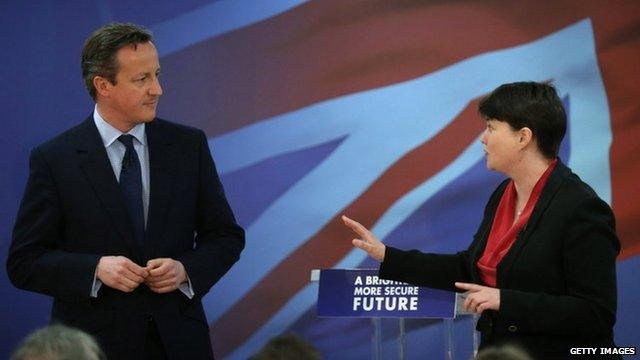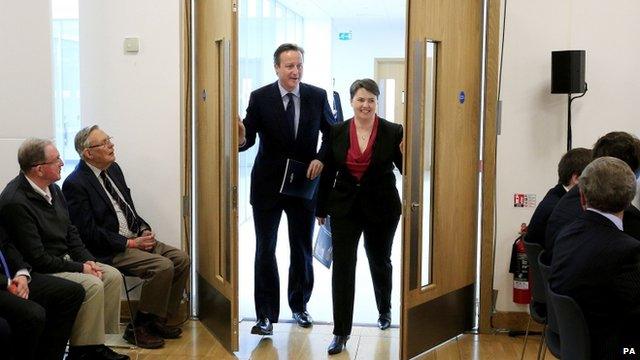Election 2015: Scottish Tory leader and her warm up act
- Published

Ruth Davidson and David Cameron were on stage together to launch their party's Scottish manifesto
Ruth Davidson was in confident mood. I know, I know, that statement is tautologous. But, even by Ms Davidson's ebullient standards, her demeanour at the launch of the Scottish Conservative manifesto was upbeat.
Perhaps it was the presence of the Prime Minister - her "warm-up act" as she, rather cheekily, described him. Perhaps it was the simple sleepless emotion of an election.
Perhaps it was her experience in the army reserve. Whatever, her tone was decidedly combative.
The Tories' opponents, she declared, had better watch out. She and her team were, apparently, "coming for the SNP and Labour."
Labour's pitch, she said, was: "Ed Miliband is great. Vote for us and we'll make him Prime Minister." By contrast, she caricatured the SNP version as: "Ed Miliband is useless. Vote for us and we'll make him Prime Minister."

Neither, she reckoned, would resonate. Not sure that, in Scotland, Labour or the SNP are palpably trembling at the prospect of Conservative advance. They are too preoccupied hammering each other. But then there is that warm-up act.
David Cameron has repeatedly - and I mean repeatedly - argued that Labour and the SNP are mutually interchangeable; that they favour broadly the same economic approach (a flawed one, according to the PM); and that they would form a pact in the Commons, by dint of enforced arithmetic.
Why make this point so frequently? I discern a dual purpose. In Scotland, the calculation is that folk of a Unionist inclination - whether Tories or not - will respond to the Tories' claim that such a deal would advance the prospect of a second independence referendum. And will vote accordingly.
South of the Border, the calculation is that the good and sensible people of England - or, more precisely, those of a Tory leaning - may be exercised by the prospect that Alex Salmond (and they always cite Mr Salmond, deliberately, as the bogey-man) will have influence over the governance of the UK.

The Tory leaders were in Glasgow together during the third week of the election campaign
It is, therefore, entirely a negative campaigning tactic. But then who said politics was purely about the positive?
Mr Cameron said that his party would act swiftly to implement the Smith Agreement on more powers for Holyrood. But they would also act on English Votes on English Laws by, as previously rehearsed here, creating an England-only scrutiny stage for measures at Westminster, including income tax, which affect England only.
Labour say this breaches the Smith Agreement - that all MPs would vote on all tax matters. Not so, say the Tories, there would be a Third Reading vote involving all MPs. It would be, says the Tory manifesto, an "enduring settlement" for the UK.
Pooling resources
But would it endure? I put it to the Prime Minister that there might be continuing pressure for full fiscal autonomy to be applied to Scotland and, thus, England. My question concluded: "Go on, Prime Minister, you know you want to."
Apparently, he doesn't. Some Tories might see the fiscal and electoral appeal of autonomy. But, I was told, not David Cameron. The UK, he argued, was much more than a random assembly of nations. It was about solidarity, about pooling financial resources for common social justice.
Today's manifesto, of course, contains much that has already featured in the UK version. Also, many of the Scottish pledges would fall to be implemented at Holyrood, not Westminster. If at all. Welcome to devolution.
Still, we were given a preview of the Tory approach - particularly if and when new tax powers are devolved.
Ruth Davidson promised.....
flexible child care
schools potentially free of council control
the reinstatement of the right to buy council and social housing
and 10,000 more apprentices.
But, she argued, with new tax power would come new political pressure. MSPs would have to be fiscally responsible. So she argued for prescription charges for those who can afford them, funding nurse recruitment - and a graduate levy, funding bursaries.
More generally, she said the Tories would always argue for low taxation - including within the new tax regime at Holyrood. But then that is a story for another day.